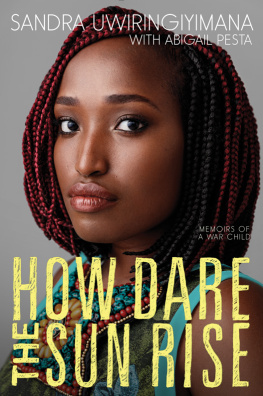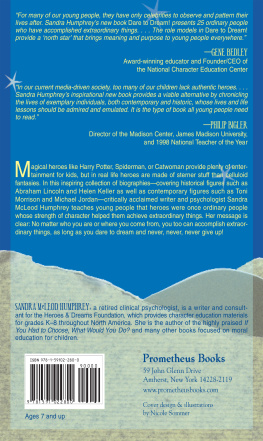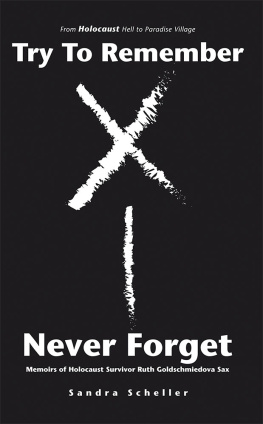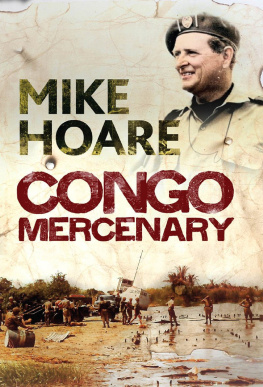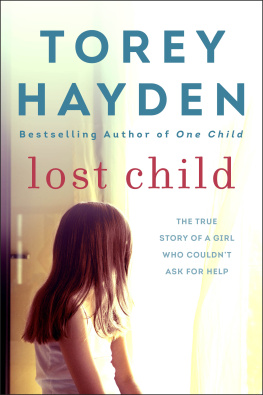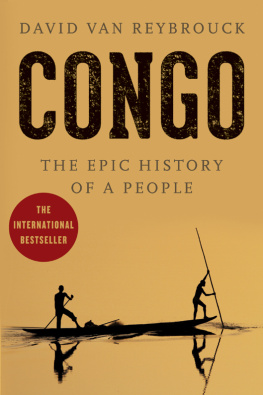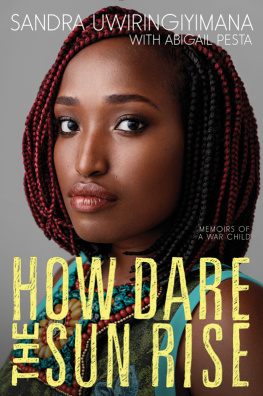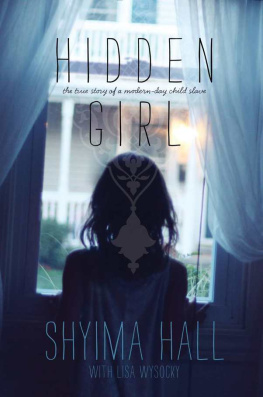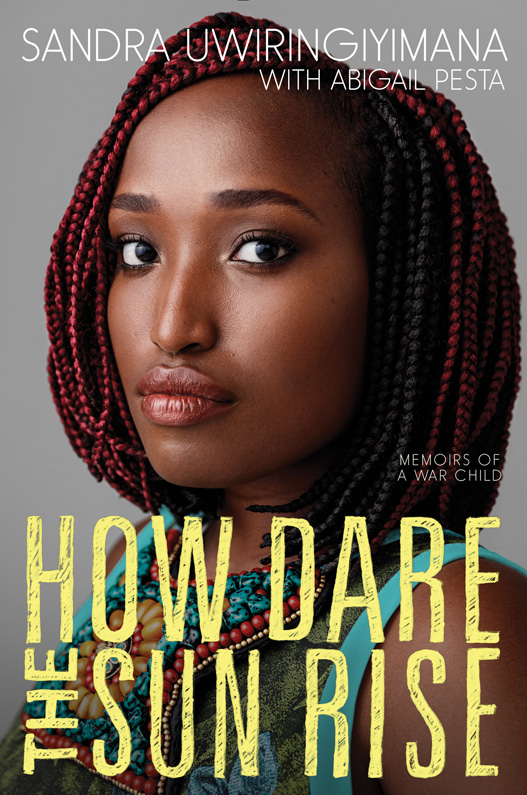THIS BOOK IS FOR YOU, MOM AND DAD.
TO YOU, DEBORAH, AND THE 165 ANGELS.
IKI GITABO NGITUYE MAMA NA PAPA.
NGITUYE DEBORAH NABAZIRA KARENGANE 165.
THE NIGHT BEGAN SOFTLY. MY LITTLE SISTER, Deborah, and I were lying in bed, closing our eyes, trying to fall asleep in the midsummer heat. It was a couple hours past dark, a scorcher of an August evening in Africa. I could hear the soothing voices of my mother and aunt, chatting outdoors in the still, heavy air. Deborah was six years old at the time, and I had just turned ten. For some reason, Deborah had been highly sentimental that day, hugging my mother and me, telling us she loved us. She did it time and again. I wondered what had come over her.
Perhaps, somehow, she sensed that she would soon be leaving us.
Sleep did not come that night. My mother stormed in from outside, a look of panic on her face like I had never seen. Mom was always such a calm, wise presence, strong and rarely rattled. At the time, we were living as refugees, driven from our home in the Democratic Republic of the Congo because we belonged to a minority tribe, the Banyamulenge. For the past three months, I had been sleeping on a mattress on the ground in a big green tent at a crowded refugee camp in Burundi run by the refugee arm of the United Nations. I shared my mattress with Mom and Deborah, the youngest of my six sisters and brothers. Mom and my sister Princesse lived in our tent too. My dad and my brothers Alex and Heritage stayed in a tent next to ours. My sister Adele and brother Chris were with my grandparents, up high in the Congolese mountains known as the Hauts Plateaux.
We were scattered, an unsettling feeling in such an uncertain time. For weeks I had been dreaming of homeour big yellow-brick house with a grass-green roof, filled with cousins and friends. I longed for the sparkling blue waters of Lake Tanganyika, the colossal lake where I loved to swim, despite my parents warnings about crocodiles. In the refugee camp, I had been imagining a time when I could return to school. I was an ace student, and I wanted desperately to put on my school uniformnavy-blue knee-length skirt, white button-down polo shirt, white socksand get back to class. I thought surely we would be going home soon, and my family would all be together again.
That was wishful thinking.
Mom shook Deborah and me from the mattress where we slept. Princesse was away for the night, attending a choir concert in a nearby city.
Mubyuke twatewe! Mom said. Wake up! We are under attack!
We shared our tent with six families, mostly women and children. We knew one another intimately, like family. When people heard my moms warning, they said, No, you must be wrong. Youre overreacting. Perhaps some thieves were stealing livestock from the nearby farm, they said, explaining away the distant sound of gunshots.
No, my mother said. And then we saw my aunt, Nyarukundo. She had been hit by gunfire while standing outside the tent. Both of her arms had been struck, and one had nearly been ripped from the socket. That arm dangled oddly from her body, dark blood gushing like a river.
We need to wrap her arm! Mom said. Help me find something to wrap it with.
I was surprised that my mother knew what to do in such a situation. It would have made sense to use my bedsheet. I had seen enough action films with my brothers to know that sheets were the go-to item in that situation, but I couldnt think. I couldnt see well either, as the tent was dark as night. I opened my suitcase and grabbed a favorite silky blue dress that made me feel like a princess. The dress was brand new, the most important and beautiful thing I owned. I had been thinking of wearing it to church that Sunday, but I was afraid to get it dirtychurch was held outside, in the middle of the camp, and we all sat on the ground. I thrust the dress at Mom. Now I wasnt worried about soiling it; I just wanted to help my aunt. But the material was too slippery to wrap her blood-soaked arm. My mother pulled off the inner layer of her traditional cotton dress and used that instead.
We heard noise approaching rapidly as men descended on the camp by foot, gunshots piercing the night. The shots sounded like popping corn at first, then grew louder as they came near. The tent erupted in chaos. People began shouting directions.
Cut a hole in the side of the tent! someone yelled. Well escape through there!
People started huddling together in a corner. Somebody stepped on my leg, sending a rush of pain through my body. Ow! I said. But nobody heard. Everyone was in a panic. Someone cut the hole in the tent, and a stream of people ran out, including one of my cousins, Jeanette.
Those people were gunned down, one by one, as they fled into the night. This isnt real, I thought. There is no way this is happening. I must be having a terrible dream. Surely I will wake up and it will all go away.
Mom grabbed my sister, my aunt, and me, along with two of my little cousins, Musore and Rusengo, who were six and nine years old. Mom said to hide beneath a mattress, and so we covered ourselves with the bed, staying close together, tense and still, down low to the ground. My aunt was in agony. The mattress was thin, and I thought about how bullets can so easily penetrate mattresses. It didnt make sense to hide beneath bedding from men with guns. But where else were we to go?
I wondered if my dad and brothers were safe. I heard our attackers singing and chanting. They were singing Christian songs. I had grown up singing some of those songs in church, and I wondered why murderers would be singing them.
Imana yabatugabiye, the men chanted. God has given you to us.
The men seemed to think they were on a mission from God to massacre us. They spoke in two languages from the region, Kirundi and Swahili. I spoke both languages, and their voices sounded familiar. Why were we being targeted by people who were praising God? Gunshots, screams, chanting. Nothing made sense. It didnt register that people were dying, that my cousin had been shot dead as she ran from the tent.
We must have been under the mattress for half an hour, huddled in silence. I didnt cry. I thought Mom would somehow find a way to protect us, because thats what mothers do.
I heard splashes hitting the tent all around us. I thought it was beginning to rain. The sound of rain was always loud in the tent, as the raindrops pelted the tarp like little torpedoes.
Then I heard a distant roarfire. It sounded like it was burning through other tents.
The chanting grew louder and closer.
God has given you to us. God has given you to us.
Suddenly there was a moment of stillness outside our tent. Maybe the men were leaving since it had started raining, I thought. There were just a few of us left in the tent, so perhaps they didnt care. They had killed everyone else. Maybe they were done.
Then we noticed the sharp fumes of kerosene. It had not begun to rain, after all: The tent had been doused in kerosene. We continued to hide, paralyzed, until we heard some men come to the entrance of the tent.
Is anyone still here? they called. Weve come to rescue you.
At first we stayed quiet. And then I heard my mother say, Have you really come to help us?
I had a panicked feeling. I didnt trust these men, even if they did speak our language. I had seen a lot of Jean-Claude Van Damme movies with my brothersI knew that if these men were bad guys, they were not going to tell us.
Come outside, the men said. We will lead you to safety.
My mother seemed to believe them. I guess she felt she had no alternative but to trust themwhat else could she do? Our tent would soon be in flames.

